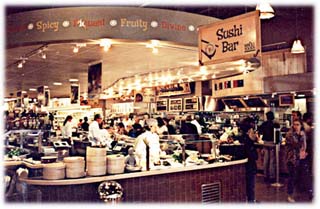Growth Industry
Whole Foods, Wild Oats, Bank on Consumers' Hunger for Natural Foods
By Erica C. Barnett, Fri., Jan. 28, 2000

The new year started grimly for Whole Foods Markets and its CEO, John Mackey. Stock prices, which had plunged to a low of $28.25 a share back in March, were stuck below $45 (from a peak of more than $70 a year before) despite steadily climbing revenues and more than a dozen new store openings in 1999. Online grocery sales, which Whole Foods executives hoped would reach $4-6 million by March, continued to stagnate for retailers across the country, a fact which Mackey tacitly acknowledged when he decided to spin off the company's Web operations into a separate company. And competition between Whole Foods and its nearest competitor, Wild Oats Markets, grew more intense than ever, as Wild Oats edged past Whole Foods in total store locations, 111 to Whole Foods' 105. Still, Whole Foods execs put their bravest faces forward through the first weeks of January, launching a daring online venture and announcing a new wave of acquisitions designed to ensure their continued dominance of the $25billion natural foods market. Among the chain's aspirations:

For better or, as some would argue, for worse, Whole Foods has come a long way from its humble origins in Austin two decades ago. Founded by partners John Mackey, Craig Weller, and Mark Skiles, at a time when you could count the number of natural foods markets in America on one hand, Whole Foods has metamorphosed into the most profitable and prolific natural foods store in the U.S. Since 1980, the company has pushed its way into markets across the nation, buying up small, independent retailers and moving in on others' corporate turf -- most notably Wild Oats', whose headquarters in Boulder are just a 10-minute drive from WholePeople.com's new digs in the small town of Thornton.
CEO Mackey, who splits his time between Texas and Colorado, has so far rebutted speculation that Whole Foods has plans to move its corporate office to Colorado. Clearly, the move would position the company to compete more effectively with Wild Oats, its closest rival. Although Wild Oats officials demur when asked what they think of their largest competitor, Mackey has made his opinions clear: "I don't like Wild Oats," he told shareholders in March.
Despite a fierce and sometimes prickly rivalry, the two chains aren't as similar as they appear. Whole Foods stores are generally larger and more experimental -- the Seattle store contains a walk-in wine cellar and a sushi bar, for example-- than Wild Oats' more traditional model. "We're really interested in regional development of separate stores," Whole Foods' Emrick says. "While they all are, of course, Whole Foods stores, we try to make each one fit in with its community."
And, although Whole Foods plans to ban genetically engineered products from its store brands (see "Natural Selection"), the company is hardly puritanical about what goes onto its shelves; products with preservatives, animal ingredients, and chemical pesticides all make the cut, as do many major-label items more commonly found in conventional supermarkets. In contrast, Wild Oats -- a 13-year-old chain which recently purchased San Antonio-based Sun Harvest for $21.5 million -- is a veritable paragon of eco-awareness, banning everything from irradiated herbs to artificial dyes to hydrogenated oils from the products in its stores.
That distinction, says Wild Oats spokesman Harry Day, is what sets his company apart from the competition. "All of our products are all-natural, organic, and preservative- and pesticide-free. I don't think [Whole Foods] can make that same claim," Day says. "When consumers come into a natural foods supermarket, they don't want to have to read all the labels and check all the ingredients to make sure what they're getting is natural. They want to know." But Whole Foods' Emrick contends that, in carrying products that consumers might seek out in a conventional supermarket, her company has "crossover" appeal. "Smaller stores are really just specialty stores," she says. "When you walk into a 40,000-square-foot grocery store you can get everything you need -- It's really one-stop shopping."
While Wild Oats' revenues, estimated at around $542.4 million for fiscal year 1999, are dwarfed by the $1.6 billion Whole Foods raked in during the same period, both stores' incomes are minuscule compared to those of their newest corporate competitors: massive chain stores like Kroger, Albertson's, and HEB, many of which have begun carrying organic and natural products alongside their conventional product lines. With thousands of stores to play with, and the ability to pour more money into risky ventures, the chains can afford to branch out into what was long the exclusive domain of natural foods specialty stores. But Wild Oats' Day thinks there will always be a place for natural foods markets in the competition for consumers' grocery dollars. "Natural and organic products are more of a side business" for supermarkets, Day says. "And I think consumers know that. -- They recognize that if the supermarkets are doing it as a side business, it's probably not the same quality or selection." ![]()
Got something to say on the subject? Send a letter to the editor.








